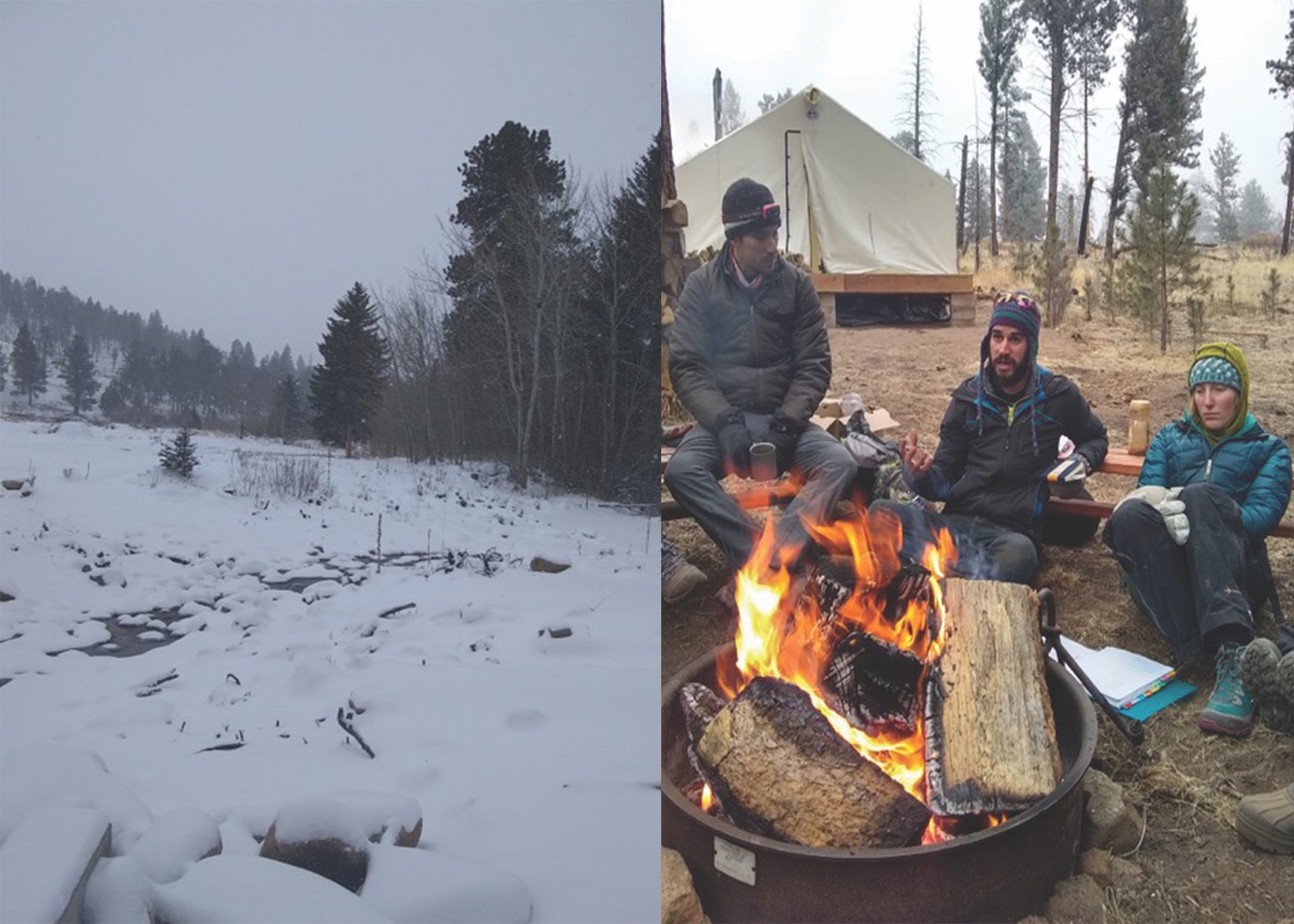 Staff training at Ramah in the Rockies. Photos courtesy of BaMidbar Wilderness Therapy
Staff training at Ramah in the Rockies. Photos courtesy of BaMidbar Wilderness Therapy It’s mid-January, snow covers the ground and biting winds blow as a dedicated group of young men and women bundled up in winter coats, stocking caps, gloves and scarves huddle around a campfire high in Colorado’s Rocky Mountains.
They’re participating in field-team training as counselors for the launch of the BaMidbar Wilderness Therapy Program, which officially began on Jan. 24. The program focuses on the emotional, behavioral and academic challenges facing young Jewish adults between the ages of 18 and 26. Courses run for 8–12 weeks and can cater to 12–20 participants at a time.
While BaMidbar is its own nonprofit organization, it uses the camp facilities of Ramah in the Rockies, a 360-acre ranch in the Pike and San Isabel National Forests, elevation 8,000 feet. BaMidbar is also partially supported by the Charles and Lynn Schusterman Family Foundation.
“It was a simple question of how many Jews out there have been going to secular or Christian wilderness programs, and is there a need for something in the Jewish framework that we can provide?” said BaMidbar Director Jory Hanselman in a phone interview with the Journal.
Hanselman credited Ramah in the Rockies Executive Director Rabbi Eliav Bock and wilderness therapist Cliff Stockton (both of whom are also part of BaMidbar’s staff) for launching the program that has been two years in the making.
Hanselman worked at Ramah in the Rockies in 2010 and 2011 as the service learning coordinator — working with the head of Jewish education to create a program offering service-based learning and experiential learning. She jumped at the opportunity to take on the director position at BaMidbar when it became available.
On a practical level, BaMidbar is both kashrut and Shabbat observant, thereby opening up the program to many who could benefit from a wilderness therapy experience but haven’t had the opportunity to do so. Hanselman said that while she believes the Jewish community has increased awareness around addiction and mental health issues in the past 10 to 15 years, “there’s still so much more work that can be done.”
“There’s a lot of stigma about mental health issues and addiction across the board, but especially in the Jewish community,” Hanselman said. “There’s a strongly expressed sentiment of ‘Jews don’t have problems with addiction’ or ‘This isn’t a Jewish problem.’ And there’s a lot of denial, quite honestly.”
In creating the BaMidbar program, Hanselman said, “Wilderness therapy programs rely really heavily on metaphor and storytelling and rituals, and as an industry they use Native American traditions.” As such, BaMidbar saw an opportunity “to really make a difference and have the program be strongly founded in Jewish ritual, Jewish tradition and Jewish metaphor and storytelling.”
“There’s a lot of stigma about mental health issues and addiction across the board, but especially in the Jewish community.” — Jory Hanselman
BaMidbar boasts a three-person clinical team, enabling primary therapists to work one-on-one with participants. There is also a field therapist who doesn’t carry individual caseloads but plays a connecting role between the therapists and what’s happening in the field, Hanselman said.
The therapeutic program includes four-day wilderness treks, with Shabbats spent at Ramah’s base camp, where participants can have individual, group and family therapy amid a strong emphasis on the family system.
“There will be a parallel process for families to integrate them into the program and better understand how they can be supportive and create healthy relationships, and how parenting a young adult is different to parenting an adolescent,” Hanselman said.
As for the decision to open the program in January, just a week before Tu B’Shevat, Hanselman said that while the season is definitely a challenge, winter can be one of the most powerful times for participants because wilderness therapy relies heavily on the idea of natural consequences.
“Using that wilderness-based environment is critical to building self and understanding personal responsibility as well as resiliency, so winter provides a powerful tool to really bring a lot of presence in the program,” Hanselman said. “A student can’t look at it as a summer camp experience. They have to engage in the critical process.”
For more information visit www.bamidbartherapy.org





















 More news and opinions than at a Shabbat dinner, right in your inbox.
More news and opinions than at a Shabbat dinner, right in your inbox.